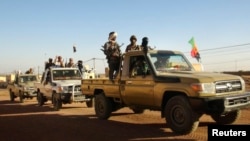DAKAR —
Mali is reportedly readying its troops to retake the far northeastern town of Kidal. Kidal is currently controlled by the Tuareg separatist group, the MNLA, which says it will negotiate but will not disarm beforehand or let the Malian army enter the town.
Malian military sources in the northern town of Gao tell VOA that a sizable number of soldiers and military police left the town last week headed north toward Kidal.
A military spokesman in Bamako told reporters Wednesday that the liberation of Kidal is the ultimate objective but declined to give further details, saying they would "see in coming days."
Questions remain as to whether the army really could or really would attack Kidal. It is not clear whether reported troop movements and tough talk aren't just meant to push forward negotiations.
Kidal remains a sore point in Mali. Many insist that its ambiguous status must be dealt with before elections can go ahead in July.
Kidal is the only major northern town not to return to Malian army control since French forces arrived in January and led a drive that drove al-Qaida-linked Islamist militants out of northern Mali's towns and cities, including Kidal.
Kidal is the seat of the Tuareg separatist group, the MNLA (National Movement for the Liberation of Azawad), whose fight for northern independence began in January 2012 and triggered the ongoing nationwide crisis just two months later.
Both the MNLA and the government have said publicly they want to negotiate, but talks haven't gotten off the ground. The government says rebels must disarm before talks.
A group of Tuareg notables, local chiefs and elected officials in Kidal created the High Council of Azawad (territory in northern Mali) on May 2. The council is trying to corral members of the armed groups in Kidal, including the MNLA, to negotiations.
Council president Mohamed ag Intallah says reconciliation is the top priority and that Malian authorities need to give them more time.
"The council is asking for at the moment is that Malian authorities stop hostilities, stop the army's mission, and give them a chance to find a peaceful solution. They want the residents of Azawad to come together at one table," said Mohammed ag Intallah, an influential figure in Kidal. He is the eldest son of the region's traditional tribal chief. But it is unclear how much support the newly created council has in the MNLA.
The MNLA says it is the government of Mali that has not been serious about negotiations.
The MNLA has agreed to give up its demand for independence and is ready to meet the conditions of the international community to accelerate dialogue," said MNLA spokesman Moussa ag Attaher. "If today Mali decides to turn a deaf ear and ventures to attack any of the six localities under MNLA control, the MNLA will have no choice but to defend itself and the local population with 'every ounce of its determination.'"
Amadou Maiga contributed reporting from Bamako, Mali.
Malian military sources in the northern town of Gao tell VOA that a sizable number of soldiers and military police left the town last week headed north toward Kidal.
A military spokesman in Bamako told reporters Wednesday that the liberation of Kidal is the ultimate objective but declined to give further details, saying they would "see in coming days."
Questions remain as to whether the army really could or really would attack Kidal. It is not clear whether reported troop movements and tough talk aren't just meant to push forward negotiations.
Kidal remains a sore point in Mali. Many insist that its ambiguous status must be dealt with before elections can go ahead in July.
Kidal is the only major northern town not to return to Malian army control since French forces arrived in January and led a drive that drove al-Qaida-linked Islamist militants out of northern Mali's towns and cities, including Kidal.
Kidal is the seat of the Tuareg separatist group, the MNLA (National Movement for the Liberation of Azawad), whose fight for northern independence began in January 2012 and triggered the ongoing nationwide crisis just two months later.
Both the MNLA and the government have said publicly they want to negotiate, but talks haven't gotten off the ground. The government says rebels must disarm before talks.
A group of Tuareg notables, local chiefs and elected officials in Kidal created the High Council of Azawad (territory in northern Mali) on May 2. The council is trying to corral members of the armed groups in Kidal, including the MNLA, to negotiations.
Council president Mohamed ag Intallah says reconciliation is the top priority and that Malian authorities need to give them more time.
"The council is asking for at the moment is that Malian authorities stop hostilities, stop the army's mission, and give them a chance to find a peaceful solution. They want the residents of Azawad to come together at one table," said Mohammed ag Intallah, an influential figure in Kidal. He is the eldest son of the region's traditional tribal chief. But it is unclear how much support the newly created council has in the MNLA.
The MNLA says it is the government of Mali that has not been serious about negotiations.
The MNLA has agreed to give up its demand for independence and is ready to meet the conditions of the international community to accelerate dialogue," said MNLA spokesman Moussa ag Attaher. "If today Mali decides to turn a deaf ear and ventures to attack any of the six localities under MNLA control, the MNLA will have no choice but to defend itself and the local population with 'every ounce of its determination.'"
Amadou Maiga contributed reporting from Bamako, Mali.











